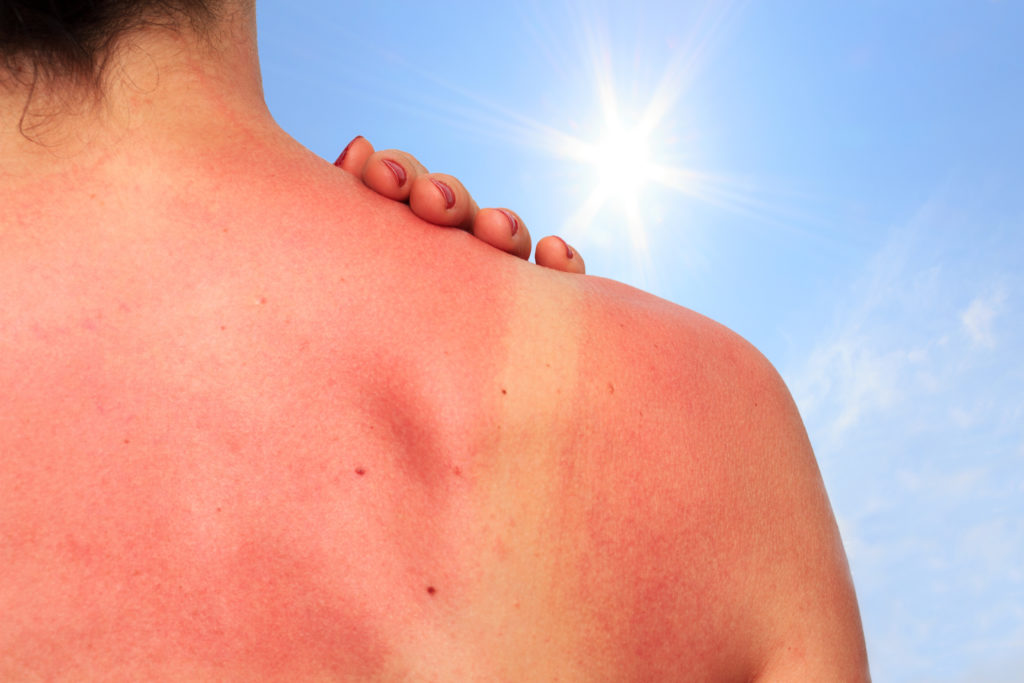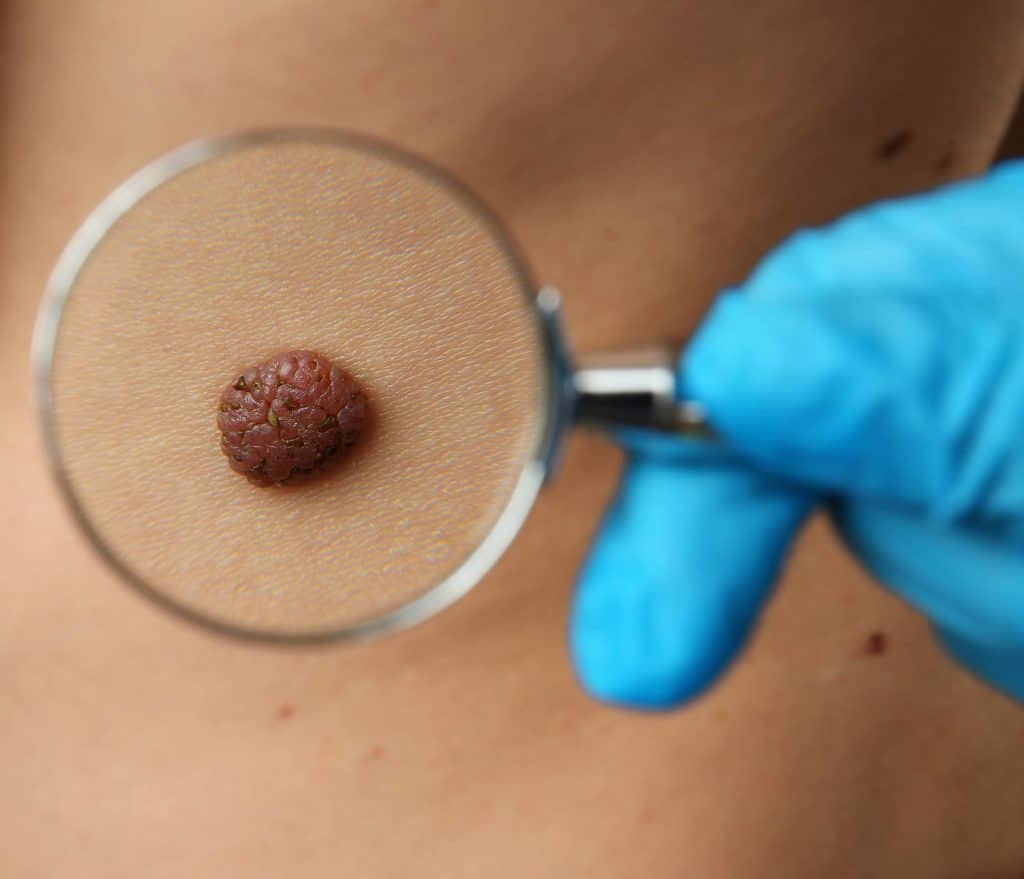Most common cancer disease in Germany: skin cancer is often deadly
According to health experts, skin cancer is the most common cancer disease in Germany. With early diagnosis, good cure, there are generally opportunities. However, if the disease is detected too late it is often fatal despite modern therapies, the discovery already of the Nobel prize for medicine was awarded.
The number of skin cancers increases
More and more people worldwide develop skin cancer. In this country, the number of patients has increased in recent years. Meanwhile, skin cancer is with around 270,000 new cases per year the most common cancer disease in Germany. As the technician health insurance (TK) in a message, writes it in each of the seventh disease to have the dangerous malignant melanoma, the skin cancer. According to the Treasury from 2009 to 2015, the bright skin cancer increased in the years by over 50 percent, and the black skin cancer by over 30 percent. Detected too late, runs the latter often fatal.

Germans are the early detection of muffle
“Is skin cancer detected early, there are generally for all kinds of very high chances of recovery,” explains the German cancer society on their website.
However, the skin cancer screening is not taken by many German citizens seriously enough.
So You recognize skin cancer
Doctors of the German cancer society recommend, the body without clothing often times in-depth a look in the mirror – the best in the light of day. Here one should, stains particularly on existing liver and on new changes to the skin care. The partner or the Partner can help. Because should be difficult to consider areas like the back and the areas between the toes and the soles of the feet will be evaluated.
In addition to the Screening self-examination is the best method for early detection. However, skin cancer can look very different. Therefore, to assess several factors need to be considered. Physicians have therefore developed the ABCDE rule to support that should be applied at the time of self-examination. One of the following is true, you should take a doctor a look at the stain. Care should be taken:
A: The A stands for asymmetry. Usually patches of skin are evenly round, oval or oblong. The patch has an unusual or asymmetrical shape, or has changed the shape of an existing spot?
B: The B stands for boundary. Liver spots are usually clearly demarcated from the rest of the skin. Is washed out of the Kontor of dark skin patches, frayed , jagged, uneven, or rough?
C: The C is for Colour (English color). Normally, the liver and pigments have the same color. The color is mixed inside of a spot with Pink, gray, or black points or crusty pads are located on a spot?
D: The D stands for diameter. The times have a semi-spherical shape, or you are at the widest point larger than five millimeters?
E: The E stands for Evolution. Thus, the change of a spot in the course of time. Has changed the Time in the last three months?

As communication means in the PBX, it uses annually, only one in five legally the free skin cancer screening Insured. These and other facts around the topic of skin cancer have combined the University hospital Hamburg-Eppendorf (UKE) and the University of Bremen together with the TK in your current skin cancer report in 2019, which was announced recently.
UV-radiation is the main risk factor
“The Figures show that skin cancer is still a serious disease that can be fatal,” says Dr. Jens Baas, Chairman of the Board of management of the techniker Krankenkasse.
“With skin cancer report, we provide a comprehensive analysis of data, to raise awareness of the issue and educate on how to handle just in the summer, be conscious of the sun”, explains the expert.
UV-radiation is considered the main risk factor for skin cancer.
“Most of the time the cause of the disease dates back some decades. 20 to 30 years need skin cancer to develop,“ explains Professor Matthias Augustin, a dermatologist at the UKE and editor of the report.
Therefore, the risk of developing skin cancer increases considerably with age. As the Figures of the Shi-show the Insured that is affected is the age group of 75 – to 79-Year-old especially. Of them, 843 ill an average of 100,000 Insured in the year of black skin cancer.
For comparison: In the 20 – to 24-Year-olds are Insured only 41 out of 100,000. Also differences between the sexes show: Up to the age of 60 years, more women are diagnosed with malignant melanoma than men. After that, the image is reversed.
To the eye, the so-called sun Bank knees at the statistics: “In the age group of 45 – to 54-year-old women, a significant increase in diagnoses, with black skin to detect cancer,” says Augustin.
“The causes could be an increased use of tanning beds and frequent sun bathing in earlier years,” explained the expert.
Other experts recently came to the conclusion that especially the Trend to Tan revenge in the 70s and 80s is becoming stronger.
Only about one out of every five goes for the early detection of
The earlier skin cancer is detected, the gentle, the disease can be treated. In the period between 2015 and 2017, only one in five took a year but Insured early detection with a skin doctor or his family doctor in the claim.
“Just because the early detection is so important, we perceive, the free skin cancer screenings regularly,” says Dr. Baas.
“By law, every two years, the Insured is entitled to an investigation. This hardly takes time and is not painful. The TK offers its Insured, this performance from the 20. Year,“ the TC chief.
Normally the cost of skin cancer screenings of the statutory health insurance until the age of 35 are. The age of taken.
Artificial intelligence supports the doctor
Years ago, researchers reported that Artificial intelligence (AI) skin can detect cancer as reliably as physicians.
In the future, modern technology will help Doctors to diagnose malignant skin lesions is more reliable.
Computer systems photo findings of suspicious skin in real time and help the doctors in diagnosis.
“In a few years, we expect high-quality Apps, which can also be used by patients for the early detection of skin cancer used,” says Dr. Baas.
“In the near future, new technologies help Doctors to make their diagnoses more reliable, and skin cancer sooner. Also the quality of the supply is increased, such as in regions where there is a shortage of dermatologists exists.“
Nobel prize in medicine helps in the treatment
According to the TK have been made in the treatment of skin cancer in the past few years, almost revolutionary progress.
The drug treatment is increasingly based on modern immune therapeutics that help the body to fight tumors themselves.
Because the immune therapy is clearly more effective and better tolerated than chemotherapy, it is not today, from the treatment of everyday life to think off.
“New data from pivotal studies were able to show that about 30 percent of patients with metastatic melanoma survive more than five years,” explains Professor Gerd Glaeske, drug expert at the University of Bremen who contributed to the Report.
“This is significantly longer than in the case of some chemo-therapies,” says the expert.
“For the discovery of this new mode of action, the so-called Checkpoint inhibitors, was awarded in the year 2018, the Nobel prize for medicine,” said Glaeske.
In the evaluation of the TK-patient data, it looks similar to this: After four years, 35 percent of patients receiving such therapy are still alive.
“In all the justified happiness about the new medicines, new therapies must show first that they are just as good as in the studies promised,” says Dr. Baas.
“In the past, identifiers, and sun protection remain important, in order to keep the risk of skin cancer as low as possible.”
The cause of skin cancer is mostly due to the behavior
Skin cancer is, in spite of all hereditary dispositions, especially of a behavioral disorder.
In the last years, the changed leisure behaviour as a trigger for skin cancer in the spotlight.
The increase in travel to Sunny regions, and the increase in Outdoor activities is considered as a possible reason for the high diagnostic numbers of skin cancer.
Avoiding excessive UV radiation, as well as effective protection by clothing and sunscreen may reduce the risk of developing skin cancer significantly.
In addition, – is often warned about the pre-tan; and before the sun fires.

“Every sunburn is one too many. Long-term UV exposure damage the skin in the long term, we need to be more aware,“ says Professor Glaeske.
The expert advises, therefore, to consistent sun protection, especially for children. “The Report provides important information on the use of the sun. Because the sun of today is the skin cancer of tomorrow,“ said Glaeske. (ad)